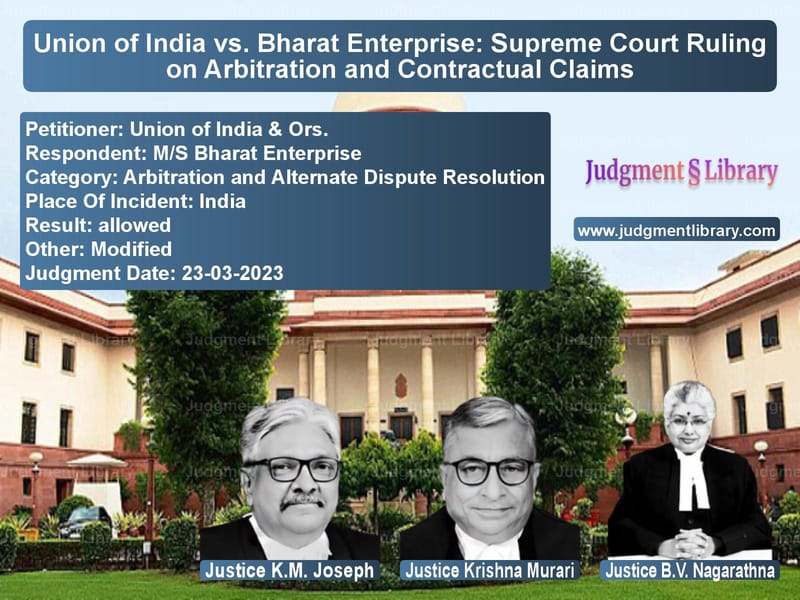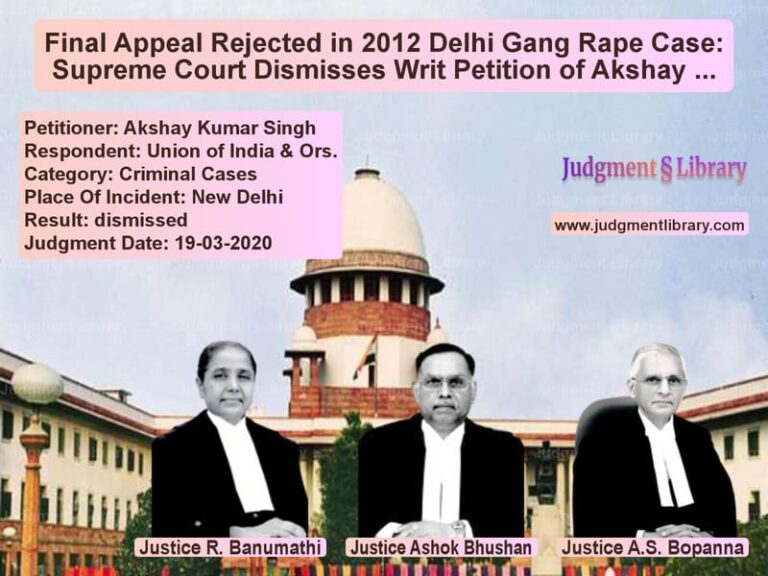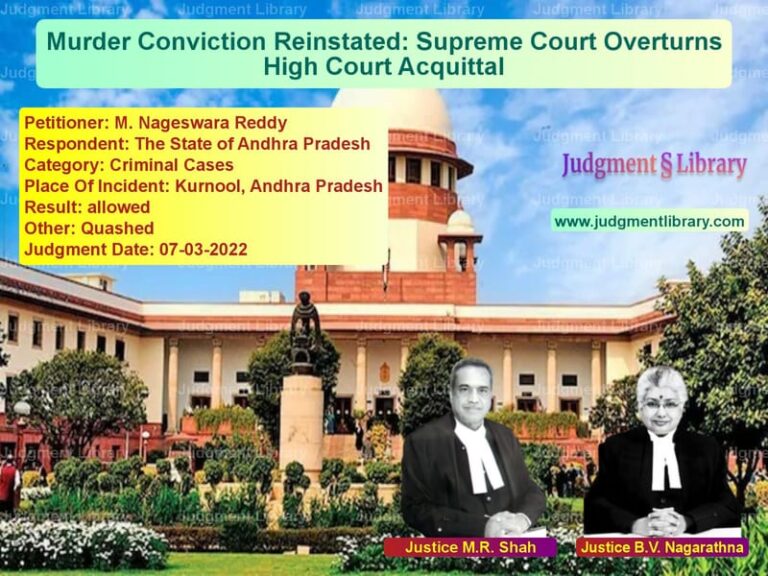Union of India vs. Bharat Enterprise: Supreme Court Ruling on Arbitration and Contractual Claims
The case of Union of India & Ors. vs. M/S Bharat Enterprise revolves around a contractual dispute where the respondent-contractor claimed non-payment for repair work under a government contract. The Supreme Court’s ruling addresses key issues related to arbitration clauses, final bill settlements, and the enforceability of contractual claims beyond what was stated in the final bill.
Background of the Case
The dispute arose from a contract between the Union of India and Bharat Enterprise for repair work, including bathrooms and allied construction, signed on July 2, 2001. The project was initially scheduled for completion by January 19, 2002. The key events leading up to the legal dispute are as follows:
- February 13, 2002: The contractor submitted the final bill, including a ‘No Claims Certificate.’
- February 25, 2003: The contractor, after waiting for a year without payment, sent a letter stating that the final bill and the No Claims Certificate were issued under protest.
- May 24, 2003: The government obtained an affidavit from the contractor withdrawing the February 25, 2003, letter.
- November 14, 2003: The contractor revoked the affidavit due to non-payment and invoked the arbitration clause.
- November 25, 2003: The government finally paid ₹1,00,358.
- September 8, 2004: The contractor sent another notice invoking arbitration.
- November 12, 2007: The contractor filed a petition under Section 11(6) of the Arbitration and Conciliation Act, 1996, seeking the appointment of an arbitrator.
Arbitration and Judicial Proceedings
The dispute was referred to arbitration, and a former District and Sessions Judge was appointed as the sole arbitrator. The government raised an objection under Section 16 of the Arbitration Act, arguing that the claims raised by the contractor were barred due to contractual clauses that prohibited claims beyond the final bill. However, this objection was rejected on March 4, 2009.
Arbitrator’s Decision
The arbitrator allowed three claims and dismissed seven, awarding additional compensation with interest. However, the government challenged the award under Section 34 of the Arbitration Act, which the District Judge upheld, setting aside the award.
High Court’s Ruling
The contractor appealed under Section 37, and the High Court reversed the District Court’s order, reinstating the arbitrator’s award. The High Court found that:
“When there is a delay in settling the final bill, it cannot be used to deprive the contractor of additional claims that might arise due to such delay.”
Arguments by the Government (Union of India)
The government challenged the High Court’s decision, arguing that:
- The arbitrator had exceeded jurisdiction by allowing claims beyond what was included in the final bill.
- The contract contained clauses (65 and 65A) that explicitly barred any additional claims after the submission of the final bill.
- The contractor had issued a No Claims Certificate, signifying full and final settlement.
Arguments by the Contractor (Bharat Enterprise)
The contractor defended the High Court’s ruling, stating that:
- The final bill was not paid for over a year, making the No Claims Certificate invalid.
- The affidavit withdrawing claims was obtained under pressure.
- The delay in payment justified additional claims that were not initially included in the final bill.
Supreme Court’s Judgment
The Supreme Court overturned the High Court’s ruling, reinstating the District Judge’s decision, and held:
1. Arbitrator Cannot Override Contractual Provisions
The Court reaffirmed that an arbitrator must operate within the contract’s terms. It cited previous rulings:
“An arbitrator cannot travel outside the boundaries of the contract. He is bound by the contract’s terms and cannot grant relief beyond what is contractually agreed.”
2. Contractual Clauses Prohibited Additional Claims
Clauses 65 and 65A of the contract explicitly stated that no further claims could be made after submitting the final bill. The Court ruled:
“The contractor was bound by the contract’s terms, which barred additional claims. The arbitrator’s award allowing such claims was legally unsustainable.”
3. Delay in Payment Does Not Justify Additional Claims
The Court rejected the contractor’s argument that the delayed payment invalidated the No Claims Certificate:
“While a delay in payment is unfortunate, it does not automatically entitle a contractor to additional claims unless the contract explicitly provides for it.”
4. No Proof of Coercion
The Court found no concrete evidence that the No Claims Certificate or affidavit were obtained under duress. It stated:
“Without proof of coercion, the No Claims Certificate remains valid and enforceable.”
Final Ruling
The Supreme Court allowed the appeal, set aside the High Court’s judgment, and reinstated the District Court’s decision to dismiss the contractor’s claims. However, in consideration of the delay in payment, the Court directed the government to pay the contractor a lumpsum amount of ₹3,00,000 as full and final settlement.
Conclusion
This ruling clarifies that contractual provisions limiting claims must be strictly enforced in arbitration. It also highlights that delays in final bill payments do not automatically justify new claims unless the contract explicitly allows it. The decision reinforces that arbitrators cannot override express contractual terms, ensuring fairness in government contracts.
Petitioner Name: Union of India & Ors..Respondent Name: M/S Bharat Enterprise.Judgment By: Justice K.M. Joseph, Justice Krishna Murari, Justice B.V. Nagarathna.Place Of Incident: India.Judgment Date: 23-03-2023.
Don’t miss out on the full details! Download the complete judgment in PDF format below and gain valuable insights instantly!
Download Judgment: union-of-india-&-ors-vs-ms-bharat-enterpris-supreme-court-of-india-judgment-dated-23-03-2023.pdf
Directly Download Judgment: Directly download this Judgment
See all petitions in Arbitration Awards
See all petitions in Contract Disputes
See all petitions in Dispute Resolution Mechanisms
See all petitions in Enforcement of Awards
See all petitions in Settlement Agreements
See all petitions in Judgment by K.M. Joseph
See all petitions in Judgment by Krishna Murari
See all petitions in Judgment by B.V. Nagarathna
See all petitions in allowed
See all petitions in Modified
See all petitions in supreme court of India judgments March 2023
See all petitions in 2023 judgments
See all posts in Arbitration and Alternate Dispute Resolution Category
See all allowed petitions in Arbitration and Alternate Dispute Resolution Category
See all Dismissed petitions in Arbitration and Alternate Dispute Resolution Category
See all partially allowed petitions in Arbitration and Alternate Dispute Resolution Category







